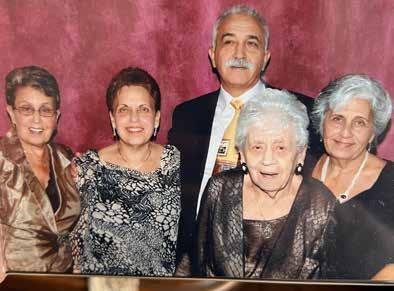
6 minute read
Around the Table with Regina Frances
August 2024

By Charlotte Rouchouze
One fiercely hot morning in June, I visited Regina Frances in her Charlotte apartment, a cozy, bright space dotted with colorful Judaica, photos, and art. We sat down at her dining table, neatly covered with a traditional embroidered linen spread that Regina told me she had handstitched with her grandmother. Our conversation drifted to another place that I imagined to be hot and sunny, the port city of Patras in the Peloponnese of Greece where Regina’s family story began. Her family was part of a very small community of Jews called the Romaniote who had been in Greece since the time of the Roman Empire and who are said to be the oldest Jewish community in Europe. A common feature of Jewish populations that were once spread out across the Mediterranean and the Middle East is that they were, in fact, made up of several culturally distinct communities with different histories. There were those who had migrated directly from the Land of Israel in ancient times after the destruction of the Temples, and there were those who had taken a more circuitous route, often via Spain. Each community carried bits and pieces of the places through which they had passed: different languages, religious customs, and foods.
Regina’s family was part of the more ancient community, which, she explained, had fully embraced their Greekness in addition to their Jewishness. They spoke Greek and Italian, had close ties with non-Jewish Greeks, and practiced neither the Ashkenazi customs typical of Jews who had migrated from Eastern Europe nor the Sephardi ones practiced by a majority of Greek Jews who descended from Spanish Jews expelled during the Inquisition. According to an article I read by archaeologist Dr. Zanet Battinou, the Romaniote Jews adopted the Greek language but kept Hebrew words, creating a unique Judeo-Greek language, while still preserving Hebrew for worship. Regina told me she grew up speaking Greek and practicing a Greek-influenced form of Judaism. They were traditional but flexible, proudly Greek but also steadfast in their Jewishness. Regina herself was only a toddler when, in 1941, the Germans invaded southern Greece, leaving the Jews at the mercy of the Nazis. The Velelli family was lucky enough to be hidden by a kind Greek family, Elias and Kathryn Michalos, who gave them a cabin they owned in the mountains on their vineyard property. The stay was not easy. This town was far more rural than anything the Velellis had ever known, and there was constant fear of Nazi raids, which occurred on two occasions. On the first one, the Nazis, having learned of the Michalos family’s secret activities, burned their home to the ground, leaving them forced to live in the cabin with the Velellis. On the second raid, the Germans destroyed the village, and the surviving villagers were later sheltered by the church.
But unlike the 87% of Greek Jews who perished in the Holocaust, most of Frances’ family survived, with the exception of two aunts and four cousins. They even managed to recover most of their property from neighbors and friends who had kept it safe for them during the war, promising to return it should the owners survive. But the Greek civil war followed on the tails of WWII, and the Greek economy was in shambles. Many of Regina’s family members planned their departure, some for Palestine and some for the United States. In the early 1950s, the family boarded the Flying Tiger propeller jet and relocated to the United States with the help of HIAS (originally the Hebrew Immigrant Aid Society) and Jewish Family Services (JFS). Their new home in Baltimore did not initially impress the 14-yearold Regina. She found the city crowded and gloomy, and the bread spongy and bland. She longed for the crusty bread of Greece. But over time the family adjusted and made the US their home. They even reunited with the Michelos family who had also immigrated to Baltimore, and became lifelong friends. Regina lived in Baltimore until, on a trip to Miami, she was begrudgingly set up with Simon Frances, who would become her husband. “I didn’t want a Greek Jew!” she told me. But he won her over, and the two made their life in Miami, where Regina lived until moving to Charlotte. When I asked Regina about other culinary memories or traditions that have stuck with her over the years, she had many. There were the orange-scented koulourakia cookies that always lived in a jar in the kitchen; there were leek fritters, zucchini fritters, beans stewed in tomato sauce, and lemony avgolemono soup; there were little fried pieces of dough called Haman’s ear that were eaten at Purim, a kosher version of moussaka, and always plenty of herbs and olive oil. Before her mother Emily’s passing, Regina decided to spend some time following her around the kitchen and writing down everything she did. She now keeps these precious recipes along with her own in a fabric-bound book that is falling apart at the seams.
A specific memory she recounted to me was of Passover in Greece. They always had a joyful and laughter-filled seder with scores of aunts and uncles. A yearly tradition at the seder table was a game in which each person held their roasted egg (hamin eggs which I discussed in a previous issue) and attempted to keep it intact while others did their best to crack it. Legend has it that Regina’s sister got her hands on a wooden darning egg, perhaps explaining her multiyear streak as the winner. Regina also described a traditional savory Passover pie they called pasteli in which a matzo meal dough was layered with ground meat and beaten eggs, all baked until crispy.
Of all the recipes Regina described, I decided to share this simple one which is perfect for late summer.
Regina’s Greek Green Beans
• 1 lb. green beans, ends and strings removed • 1 onion, sliced • ¼ cup olive oil
• 1 8 oz. (small) can of tomato sauce
• 1 bunch of flat Italian parsley, chopped • Salt and pepper
First, heat the oil over medium heat and fry the onions until transparent. Add tomato sauce and sauté for an additional few minutes. Next, add the beans and the equivalent of two cans of water. Allow the beans to cook until the water has evaporated. Toward the end of cooking add chopped parsley and season to taste.
For more information about the Romaniote Jews of Greece, check out the website of the Kehila Kedosha Janina synagogue and museum in the Lower East Side of New York City,the last remaining Romaniote synagogue in the Western Hemisphere.
Charlotte Rouchouze, PhD is a local French teacher, food blogger, and beaded jewelry designer. Her blog about food traditions from around the world can be found at www.thechildrenstable.com. Contact her at charlotte.rouchouze@yahoo. com.











